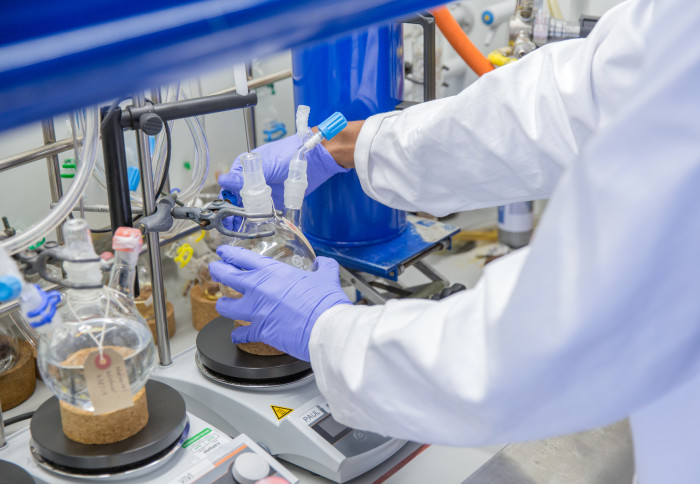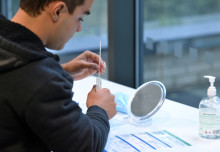

Ionic liquids have been shown to stabilise medicines by preventing protein misfolding, in a new study from Imperial College London.
In the study the team used ionic liquids, a type of salt that exists in liquid form, to stabilise high concentrations of the antibody immunoglobin G4 (IgG4) – a protein which has medical applications. Their results showed that the ionic liquid formulation held the IgG4 in place and prevented the protein misfolding, which is what causes medicines to spoil and is believed to be the cause of a range of neurodegenerative diseases.
The findings could enable medicines to be stored for longer and at warmer temperatures, which could be a game changer for developing countries without refrigeration and in rural areas where medicines must travel further to reach patients.
The results have been published in Chemical Science and the patented technology is being offered for license to industry partners through Imperial’s technology licensing portfolio.
Stabilising proteins
The research team emphasise the importance of developing new formulations, or excipients, to prevent proteins misfolding, as many new drugs are abandoned by pharmaceutical companies at the development stage due to their instability. In the current market, companies are limited in the range of excipients on offer, many of which become ineffective in liquid solutions and at high temperatures.
“New methods of storing medicines are going to be vital in meeting the healthcare needs of the global population, especially for those countries without traditional refrigeration facilities." Professor Jason Hallett Department of Chemical Engineering
Active ingredients in medicines, such as proteins, needs stabilising to prevent them from misfolding and ‘clumping’ together, known as aggregating. This happens when the proteins change shape within the liquid they’re contained in, often water, before being administered. This can damage the efficacy of the drug and in the worst case make it degrade and become unusable.
Lead author Professor Jason Hallett, from the Department of Chemical Engineering, said: “New methods of storing medicines are going to be vital in meeting the healthcare needs of the global population, especially for those countries without traditional refrigeration facilities.
"We have seen this with the COVID-19 pandemic where some vaccines require extra cold storage, and others have been discarded because they reached the end of their shelf life.”
Understanding the misfolding phenomena
The results of the study also provide valuable experimental data on the mechanisms of protein misfolding and how to prevent protein aggregation, which could enhance our understanding of neurogenerative diseases such as Alzheimer’s and Parkinson’s.

Co-author Dr Talia Shmool added: “Discovering new drugs for protein misfolding diseases and stabilising proteins in solution is still an immense challenge. This is largely because our understanding of the mechanism of protein misfolding and aggregation is limited.
“We hope that our work and developed methodology will provide insight into the molecular basis of the protein misfolding phenomena and as well as developing protein formulations of enhanced stability.”
The team have patented their ionic liquid technology stabilising pharmaceuticals in solution without the need for refrigeration or freeze-drying and with support from commercialisation specialists in Imperial’s Enterprise team, they are making the technology available for license to industry partners who can help turn the research into innovative new medicinal products. They will continue their research into developing experimental and theoretical approaches for studying protein misfolding.
-
'An experimental approach probing the conformational transitions and energy landscape of antibodies: a glimmer of hope for reviving lost therapeutic candidates using ionic liquid' by Shmool et.al. published 22 June 2021 in Chemical Science.
Article text (excluding photos or graphics) © Imperial College London.
Photos and graphics subject to third party copyright used with permission or © Imperial College London.
Reporter

Sara West
Communications Division

Contact details
Tel: +44 (0)20 7594 6607
Email: sara.west@imperial.ac.uk
Show all stories by this author



